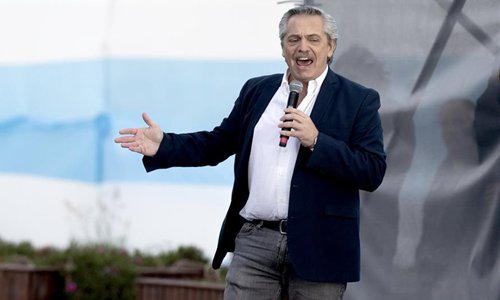
President-elect of Argentina Alberto Fernández Photo: Xinhua
Peronism has united and defeated Mauricio Macri. The different branches of the most traditional party in Argentina since Juan Domingo Perón in the 1940s became united when Cristina Fernandez took a step back and asked Alberto Fernandez to be the presidential candidate.The final election was decided and the Peronist formula of Alberto Fernandez - Cristina Fernandez won in the first round with 48 percent of the votes against 40 percent from the current president Macri. The major surprise was in Buenos Aires Province, where more than a third of the population is concentrated. The young former minister of economy, a heterodox economist, Axel Kicillof won with more than 50 percent of the votes.
Alberto Fernandez has an economic bomb on his hands left by Macri. He will need to cut the right cable well and fast.
The Macri government increased foreign debt from 41 percent to more than 90 percent, poverty rose to 35 percent of the population, inflation is more than 50 percent, interest rates hit 70 percent, and the devaluation of the national currency was almost 400 percent. The country is near a new default and with large due dates for 2020. The situation is chaotic and reforms will be needed to increase reserves and foreign exchanges.
This election was the confirmation of the failure of the IMF agenda for Argentina for the third time in the last four decades. It adds a new fiasco in the extended list of countries that sank after implementing IMF policies. This time, the loan given to Macri was based on economic risks and more than 90 percent of it has already flowed out to foreign accounts, going against the IMF's own statute banning capital flight.
The IMF is now delaying the last disbursement of the largest loan in the institution's entire history, the last committed amount of $5.4 billion from a $55 billion loan, complicating the fragile economic situation even more. The majority of Argentinians believe that Alberto Fernandez can make it, since he was the chief of the cabinet during the Nestor Kirchner presidency and a key negotiator of the external debt after the economic collapse in 2001.
In this regard, the newly elected president asked Macri for responsibility to make the correct decisions in order to contain the crisis. Macri and Alberto Fernandez have met on Monday to coordinate an organized transition. It will not be easy. The new agenda will place emphasis on employment, health, education and production, but they have few reserves. They will pay back the IMF, but the country needs growth. After the elections, the current Minister of Economy implemented a strict restriction on buying dollars to contain the capital flow. Retail savers will be able to buy only $200 per month from the $10,000 restriction the bank imposed at the beginning of September.
This election is framed in a peculiar Latin American context. Over the last few months, huge demonstrations in Chile and Ecuador against the neoliberal agenda have forced their presidents to set up important reforms.
In Ecuador, President Lenín Moreno restored previous oil prices. In Chile, President Sebastían Piñera brought in an entirely new cabinet to hold on to power. Since the 1970s, Chile has been hailed as a "model" in Latin America by the neoliberal media, a country in which this agenda started in 1973 with the attack on La Moneda Palace and the coup d'état against then president Salvador Allende.
Everything in Chile is privatized - education, health, pensions, and even water. But the neoliberal dream is a nightmare for the majority of the population in Chile, the most unequal country in the most unequal continent, Latin America. Protests in Ecuador and Chile had no specific leadership, and the outcome of this process is a question mark.
Cristina Fernandez and Alberto Fernandez mentioned Sunday the success of Evo Morales in the Bolivian election and his new term in the context of criticism of the electoral process by the US. The formula also asked for the liberation of Lula from an unjust political prison sentence from a biased judge who condemned him and is now minister of justice.
The progressive wings in Latin America are now hopeful of recovering the protagonist role as they did in the beginning of the 2000s, to return to a path of national and even development based on the real economy instead of financial speculation.
Alberto Fernandez stated: "We came back to do it better." This is a new opportunity for all the progressive sectors in the region. The way forward is tricky and has many obstacles, but the people from this region dream of, and have shown the way to, a better future.
The author is an Argentine scholar at the Renmin University of China. opinion@globaltimes.com.cn
